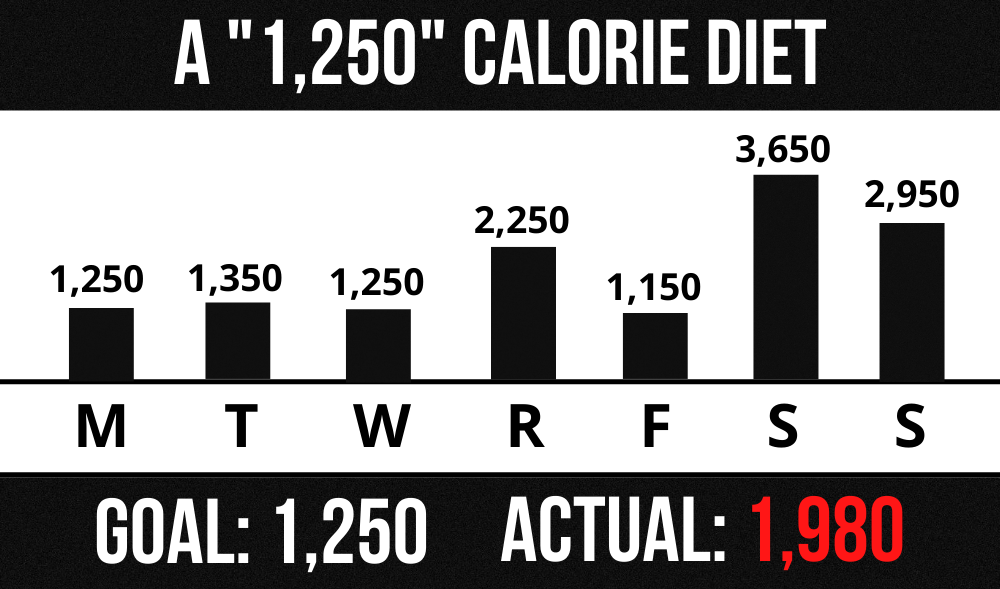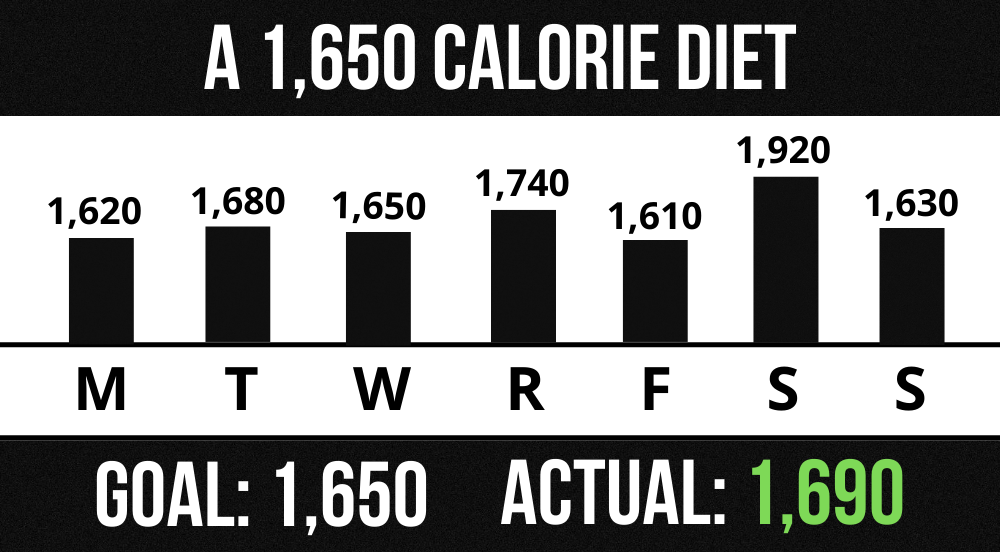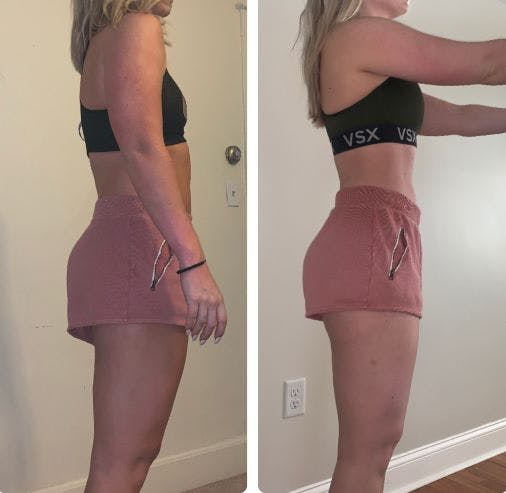You’ve probably been told that a single day of overeating won’t ruin your progress.
This is absolutely true in the long-term. But overeating on a weekly basis can set you back in the short-term and lead to massive burnout.
To illustrate this, let’s pretend it takes 2,050 calories per day to maintain your bodyweight, and you try to eat 1,250 calories per day because you want to see the scale go down as quickly as possible.
If you’re in an 800 calorie deficit per day, you can expect to lose ~1.6 pounds per week (a pound is 3,500 calories). What this pretty little math equation doesn’t account for, however, is the human being who’s supposed to eat 1,250 calories in a world that routinely serves 1,000+ calorie appetizers. In reality, here’s what ends up happening:
- Monday: 1,250 calories
- Tuesday: 1,350 calories
- Wednesday: 1,250 calories
- Thursday: 2,250 calories (date night)
- Friday: 1,150 calories (overcompensation for Thursday)
- Saturday: 3,650 calories (big night out fueled by deprivation)
- Sunday: 2,950 calories (“I’ll just start fresh tomorrow”)
Here’s a visual:

As you can see, you suffered through four miserably low calorie days, only to average 1,980 calories per day: 70 calories under your maintenance. As a result, your hypothetical 1.6 pound per week pace was reduced to .14 pounds per week.
IMPORTANT: If you think there’s no way you’re eating 2,950+ calories on the weekends, think again. A few pieces of bread and oil before your meal can clock in at 700+ calories and a single margarita can be 500+ calories. Having a lot of calories doesn’t mean you’re having a lot of food.
Unfortunately, I know what happens next.
I’m going to share the best way to break out of this cycle, and 95% of people will never try it—largely because it flies in the face of everything you’ve been told about weight loss (“eat less if you’re not seeing progress”).
But in the off chance you’re interested in lasting results, and not just fleeting scale change, here’s the single most effective strategy for no longer overeating:
Eating more.
A lot more. More than you’re comfortable with. More than you think you should be. To the point where it doesn’t even feel like you’re dieting.
I want you to keep as much food on your plate as humanly possible while still seeing meaningful fat loss (an important caveat). There’s no better way to avoid overeating, and I’ll explain why:
Let’s go back to the above scenario, to a person whose maintenance calories are 2,050 calories per day. Assuming they were coachable and open to change (this isn’t always the case), I might set their calorie range to 1,600-1,700. At which point, people panic:
“This feels like SO much food! Are you sure I should be eating this much?”
But here’s how this change plays out:
- Monday: 1,620 calories
- Tuesday: 1,680 calories
- Wednesday: 1,650 calories
- Thursday: 1,740 calories (date night)
- Friday: 1,610 calories (no need to overcompensate)
- Saturday: 1,920 calories (a moderate night out)
- Sunday: 1,630 calories (a regular day)
Here’s a visual:

Now, as a result of eight factors I’ll break down momentarily, this person averaged ~1,690 calories per day: 360 calories under their maintenance. This is a .72 pound per week pace, which is very solid over a 6-12+ month period (35-40 pounds per year is nothing to sneeze at).
And yes, we can theoretically accelerate this process with a lower calorie range—but the whole reason you’re overeating so often is because you’re pursuing fast results—not lasting results. If you want this to change, you need to be open to change.
In case you need further convincing to eat more, here are five short-term implications of undereating—which we’ll consider to be an unnecessarily large deficit—when you’re trying to lose weight:
✕ More psychological stress
If you’re eating as few calories as possible, you can’t help but think about food 24/7. After all, an unplanned muffin from Dunkin’ might be 40% of your calories for the day. This is highly stressful, and leads to major blowouts when you inevitably go over your calorie goal.
The alternative—eating enough calories to enjoy unplanned splurges—allows you to stop agonizing over food and focus on other, more important areas of your life.
✕ Less food flexibility
Let’s use the Dunkin’ muffin as an example:
A blueberry muffin clocks in at 460 calories, which is nearly 40% of a 1,250 calorie goal. If you choose to splurge on this, and still want to hit your calories, you essentially need to be “perfect” for the rest of the day. If your calorie range is higher, however, you won’t need to be this strict after splurging. At 1,650 calories per day, a 460 calorie muffin still leaves you 1,190 calories to work with.
✕ Worse workouts
While food is far more than fuel (an expression I don’t always love), it’s obviously what allows you to perform well during your workouts.* This makes it easier to maintain muscle, stay energized, and enjoy moving your body.
*In case you needed yet another reason to eat carbs: they’re the best fuel source for hard workouts (sorry, keto lovers).
✕ Worse sleep
In my experience, most people don’t sleep well when their stomachs are roaring at them before bed. As a result, they sleep poorly, grow to resent the dieting process, or throw in the towel and scarf down a bunch of food to make the feeling go away—all of which can be avoided with a more moderate calorie goal.
✕ More hunger and cravings
When you eat fewer calories than your body needs to maintain its weight, ghrelin (your hunger hormone) tells your brain you need more food. Naturally, the less you eat, the more intense this sensation becomes. Leptin, on the other hand, is a hormone that decreases your appetite. When you eat more food, it tells your brain you’re satisfied.
Any time you diet, these hormones are impacted, because our bodies like homeostasis and “resist” change. But this doesn’t mean we need to literally suffer to lose fat. If you stop undereating, these sensations won’t be so intense.
Personally, I think these short-term issues are bad enough, but there’s more to it. Here are three long-term implications of undereating when you’re trying to lose weight:
✕ Muscle loss
If you lose weight too quickly (2+ pounds per week for most people), you can expect to lose some muscle. This is highly problematic for a few reasons:
- You burn fewer calories at rest, because muscle is more “metabolically active” than fat
- You reduce your “strength potential,” which is how strong you can get during your workouts. You may not think this matters, but your ability to maintain and develop strength over time transforms your body more than almost any other factor
- You won’t look as “toned,” because the look you’re after requires you to carry some muscle (think of the transformation process like chipping away at a sculpture: there needs to be something underneath)
When people mention weight loss goals, they really have fat loss goals, which requires muscle to be maintained. In some cases, your weight won’t even change that much when you’re losing fat. Take it from my longtime client Jen, whose weight didn’t change much between these photos:

That’s why it’s so important to maintain muscle, and know how to assess your progress.
✕ Metabolic adaptation
If you’re unfamiliar, metabolic adaptation refers to the “slowing” of your metabolism when you’re dieting. People in my industry love to spin this, claiming “starvation mode” is the reason you’re not losing weight. Conveniently, they’ll have a program on sale with the supposed solution to your problem.
But I’m happy to save you $47, and tell you (A) metabolic adaptation is not inherently bad, and happens to some degree every time you diet, and (B) the reason so many people lose weight when they increase their calories is NOT because they’re eating more calories. It’s because it’s easier to stick to a higher calorie target, as you saw in the graphs above.
So it may seem like you’re eating more, but your weekly average is actually lower.
All this said, there’s obviously merit to avoiding severe metabolic adaptations, which is easily avoidable when you eat more food. Here’s why:
- Your body won’t need to “respond” as much (by reducing its metabolic rate and increasing ghrelin levels)
- You generally won’t reduce your NEAT (non-exercise activity) as much—which is natural, subconscious response to dieting, as our bodies like to conserve energy by moving less
- Your workouts go better, and you maintain more muscle. This keeps your BMR (basal metabolic rate) higher, and allows you to burn more calories at rest
It’s worth reiterating that metabolic adaption is inevitable when you’re dieting, and avoiding it altogether is not a realistic or sensible goal. Instead, we need to focus on “mitigating” the damage with extra food, diet breaks, and maintenance phases.
✕ Yo-yo results
I can’t think of many goals more directly opposed than:
- “I want to lose weight as quickly as possible”
- “I want to keep the weight off”
I hate to break it to you (okay, that’s a lie), but what’s required for the first goal makes the second goal next-to-impossible. When you eat 800-1,250 calories per day, you wreak havoc on your body, brain, and relationship with food. Because of this, it’s only a matter of time before you lose steam and revert to your old habits. That’s why so many of us diet for years on end with little to show for it.
At this point, if you’re not convinced eating as much food as possible is in your best interest, I’m either a horrible writer, or you consider dieting a fun pastime. In any case, there’s a glaring gap in the numerically driven, science-based conversation we’ve had so far:
Your flexibility levels.
Even if you take my advice and eat more in an effort to avoid overeating, you run the risk of doing it anyway if all you eat is extra servings of chicken and broccoli. That’s why I have my clients “use” as many as 10-20% of their daily calories on fun splurges. If you’re eating 1,600-1,700 calories per day, this is 160-340 calories. Here’s what this could look like:
- A small bag of chips (160-320 calories)
- A glass of wine (120-240 calories)
- A McDonald’s fry (220-330)
- A Reese’s or Snickers (180-215 calories)
There’s absolutely no reason you shouldn’t have splurges like this on a regular basis. In fact, it’s counterproductive not to. If you don’t, it’s only a matter of time before you “snap” and eat these foods in massive quantities. Which means our unorthodox strategy for avoiding overeating and setting yourself back is actually two-fold:
- Eat as many calories as you possibly can (while still seeing meaningful fat loss)
- Allocate 10-20% of those calories toward splurges on a daily basis
The alternative—eating 800-1,250 calories per day and being as strict as possible—is why you’ve dieted so many times and still aren’t where you want to be.
If you haven’t the slightest clue how to turn this around with a sensible calorie goal, here’s how I set up my clients for lasting success:
How to Count Calories to Guarantee Weight Loss
Don’t hesitate to shoot me an email, either. I’m always happy to help people break out of the yo-yo cycle.





